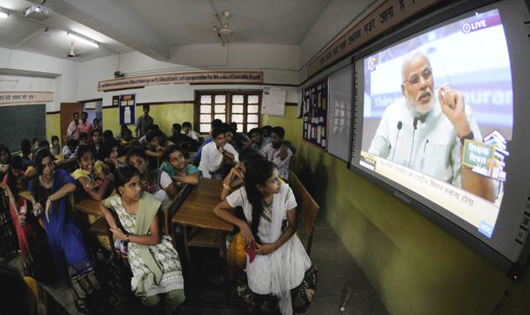New Delhi, Sep 4: “Dream big”, “think positive”, “you don't need to join the military to serve the nation as the smallest of deeds also help in nation-building”, “make notes on whatever interests you'', “don't be cowed down by criticism or failure'',... were among the lessons Prime Minister Narendra Modi had as he addressed students from across the country through video-conferencing on Friday on the eve of Teachers’ Day.

Adopting a conversational style in which he invariably counter-questioned the children asking him questions, Mr. Modi punctuated his replies with a few personal anecdotes including the fact that he does not use notes while speaking because they have put him in trouble, and that his parents did not have any big dreams for him – “they would have been happy even if I had become a clerk''.
The students had a range of personal questions for Mr. Modi including his sartorial style; particularly, the half-sleeve ‘Modi kurtas’. “I do not have any fashion designer though some have claimed to be. I have never tried to deny these reports because what all can one deny? I designed my half-sleeve kurtas myself because it was convenient compared to the long-sleeved ones. So, one day I just cut off the sleeves myself and now it’s called fashion. But, yes, I was always particular about turning out well even when my family did not have the means.''
For positive thinking, he recommended the Pollyanna books; for better oratory skills, he suggested that children turn to “google guru” and YouTube to listen to the speeches of great leaders. He flagged Yoga as a viable employment opportunity. “After International Yoga Day, there is so much interest in Yoga that there is a demand for good instructors.”
The Prime Minister also had a lesson for parents and urged them not to impose their dreams – fulfilled and unfulfilled – on their children. “Allow your children to discover themselves and follow their own dreams,'' And, to both parents and children, the message from the PM's classroom was that there is no yardstick nor time frame for success; keep on trying to improve and that itself is a success.
Elaborating on what can be done to serve the nation, Mr. Modi's reply was that one does not need to join the military to do that. “Even switching off lights, not wasting food, and similar deeds all contribute to nation-building.”
On the policy front, he indicated that the Government was toying with the idea of replacing the character certificate with an “aptitude certificate” that would include a periodic peer review from the schooling stage itself. This is the second time he has addressed children on the occasion of Teachers' Day and said the effort was to elevate it from the annual ritual it had become. He also had an explanation for why only achievers among children were selected to question him; stating that it was done to draw attention to the role of teachers in seeing the spark in such kids.






Comments
Add new comment